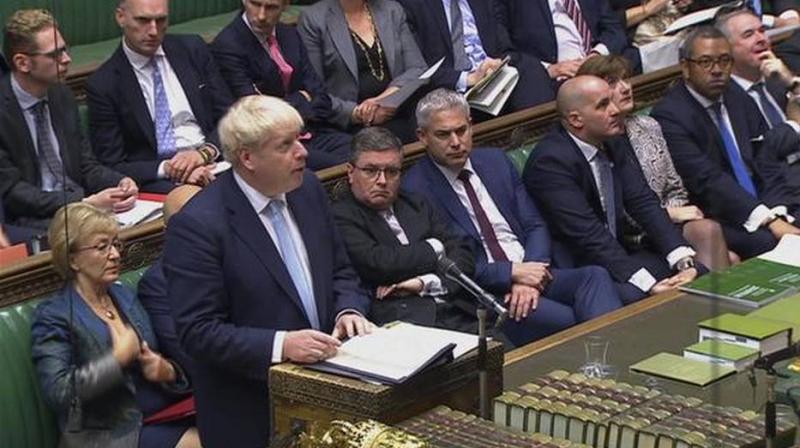Britain unveils new Brexit plan with warning of no deal
Like his predecessor Theresa May, Johnson has struggled against a hostile parliament over Brexit.

London: Prime Minister Boris Johnson on Wednesday published his “final” Brexit proposals, warning EU leaders that Britain will walk out without a deal on October 31 if they do not accept his terms.
Officials in Brussels and UK opponents of Brexit fear economic chaos if Britain ends its 46-year membership of the European Union without a formal divorce agreement.
Johnson had earlier warned that this was his “final” offer. But his complex new solution met an initially cool response from Brussels.
A senior MEP said the European Parliament's initial reaction to it was “not positive at all”.
Johnson said the sides had until October 11 to hammer out the main outlines of a compromise so it could be included on the agenda of a EU leaders' summit in Brussels on October 17-18.
“Let us be in no doubt... what the alternative is – the alternative is no deal,” Johnson told his Conservative party conference in Manchester.
“It is not an outcome we seek at all. But let me tell you my friends, it is an outcome for which we are ready.”
Johnson's latest plan includes several basic provisions – including a potential four-year time limit – that EU leaders have categorically rejected in the past.
'Not positive'
After speaking by phone to Johnson, European Commission president Jean-Claude Juncker pointed to “problematic points that will need further work in the coming days”.
Irish Prime Minister Leo Varadkar said Johnson's proposals “do not fully meet the agreed objectives,” although he promised to “study them in further detail”.
And the head of the European Parliament's Brexit steering group (BSG) Guy Verhofstadt suggested the UK offer was not a serious attempt at reaching a deal but an effort to shift blame for failure to Brussels.
“The first assessment of nearly every member in the BSG was not positive at all,” Verhofstadt said.
'Bridge to nowhere'
A leading voice in the “leave” campaign during the 2016 referendum on Brexit, Johnson rose to power in July on a promise to get Britain out of the EU come what may.
He vowed to remove the most contentious part of the deal his predecessor Theresa May struck with the bloc in 2017: the so-called “backstop” solution for Northern Ireland.
The stopgap arrangement is meant to keep the border open between EU member Ireland and British Northern Ireland after Brexit.
The border issue is a delicate issue in Ireland, where sectarian violence killed thousands of people over the decades before the Good Friday Agreement in 1998.
Brexit supporters fear the backstop would leave Britain subject to EU rules.
Johnson told Juncker the EU-backed backstop was “a bridge to nowhere”.
He proposed his own temporary customs arrangements.
One would see goods move across the border “using a declaration” instead of inspection.
Physical checks would instead be conducted at sites far from the actual border – a step designed to appease Irish concerns.
Under Johnson's plans, Northern Ireland could temporarily continue to follow EU regulations.
But crucially, Johnson also put an effective four-year time limit on this plan. This has been a deal-breaker for Brussels, which wants a fail-safe way for maintaining the bloc's territorial integrity.
'We will not extend'
Risking the wrath of the opposition at a crucial stage of the crisis, Johnson's government also announced on Wednesday it would suspend parliament on October 8-14 so Queen Elizabeth II could set out the government's new programme.
Usually a technicality, the move gained political overtones after the Supreme Court overturned his previous attempt to close the chamber for five weeks, calling it an illegal bid to block Brexit debates.
Like his predecessor Theresa May, Johnson has struggled against a hostile parliament over Brexit.
MPs last month passed a law demanding he seeks to delay Brexit if he has not reached an agreement by the time of the EU summit on October 17.
It remains unclear how Johnson intends to leave the bloc at the end of the month if there is no compromise and still abide by UK law.
“The government has been very clear,” UK foreign minister Dominic Raab told lawmakers. “We will respect the law but we will not extend beyond October 31”.
London's FTSE 100 index – already down on global growth concerns – slumped further on Wednesday, losing 3.2 pc.
Catch the latest news, live coverage and in-depth analyses from India and World. Follow us on Facebook and Twitter.

